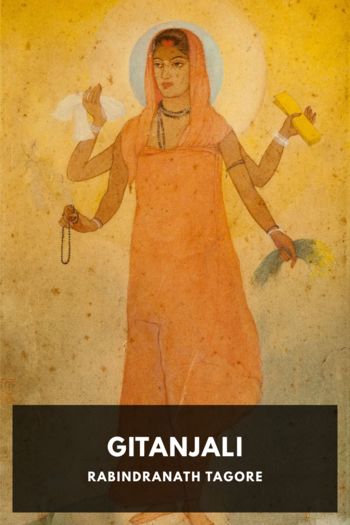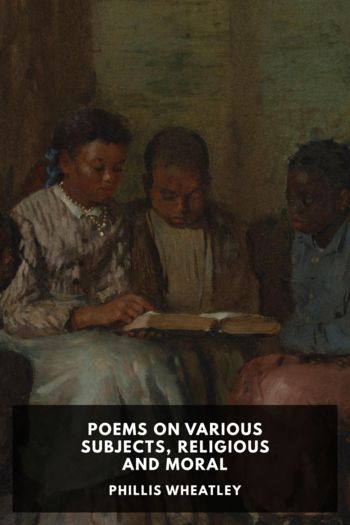My Reminiscences by Rabindranath Tagore (free children's ebooks pdf .TXT) 📕

- Author: Rabindranath Tagore
Book online «My Reminiscences by Rabindranath Tagore (free children's ebooks pdf .TXT) 📕». Author Rabindranath Tagore
The golden temple of Amritsar comes back to me like a dream. Many a morning have I accompanied my father to this Gurudarbar of the Sikhs in the middle of the lake. There the sacred chanting resounds continually. My father, seated amidst the throng of worshippers, would sometimes add his voice to the hymn of praise, and finding a stranger joining in their devotions they would wax enthusiastically cordial, and we would return loaded with the sanctified offerings of sugar crystals and other sweets.
One day my father invited one of the chanting choir to our place and got him to sing us some of their sacred songs. The man went away probably more than satisfied with the reward he received. The result was that we had to take stern measures of self-defence—such an insistent army of singers invaded us. When they found our house impregnable, the musicians began to waylay us in the streets. And as we went out for our walk in the morning, every now and then would appear a tambura,26 slung over a shoulder, at which we felt like game birds at the sight of the muzzle of the hunter’s gun. Indeed, so wary did we become that the twang of the tambura, from a distance, scared us away and utterly failed to bag us.
When evening fell, my father would sit out in the verandah facing the garden. I would then be summoned to sing to him. The moon has risen; its beams, passing though the trees, have fallen on the verandah floor; I am singing in the Behaga mode:
“O Companion in the darkest passage of life. …”
My father with bowed head and clasped hands is intently listening. I can recall this evening scene even now.
I have told of my father’s amusement on hearing from Srikantha Babu of my maiden attempt at a devotional poem. I am reminded how, later, I had my recompense. On the occasion of one of our Magh festivals several of the hymns were of my composition. One of them was
“The eye sees thee not, who art the pupil of every eye. …”
My father was then bedridden at Chinsurah. He sent for me and my brother Jyoti. He asked my brother to accompany me on the harmonium and got me to sing all my hymns one after the other—some of them I had to sing twice over. When I had finished he said:
“If the king of the country had known the language and could appreciate its literature, he would doubtless have rewarded the poet. Since that is not so, I suppose I must do it.” With which he handed me a cheque.
My father had brought with him some volumes of the Peter Parley series from which to teach me. He selected the life of Benjamin Franklin to begin with. He thought it would read like a story book and be both entertaining and instructive. But he found out his mistake soon after we began it. Benjamin Franklin was much too businesslike a person. The narrowness of his calculated morality disgusted my father. In some cases he would get so impatient at the worldly prudence of Franklin that he could not help using strong words of denunciation. Before this I had nothing to do with Sanskrit beyond getting some rules of grammar by rote. My father started me on the second Sanskrit reader at one bound, leaving me to learn the declensions as we went on. The advance I had made in Bengali27 stood me in good stead. My father also encouraged me to try Sanskrit composition from the very outset. With the vocabulary acquired from my Sanskrit reader I built up grandiose compound words with a profuse sprinkling of sonorous m’s and n’s making altogether a most diabolical medley of the language of the gods. But my father never scoffed at my temerity.
Then there were the readings from Proctor’s Popular Astronomy which my father explained to me in easy language and which I then rendered into Bengali.
Among the books which my father had brought for his own use, my attention would be mostly attracted by a ten or twelve volume edition of Gibbon’s Rome. They looked remarkably dry. “Being a boy,” I thought, “I am helpless and read many books because I have to. But why should a grown up person, who need not read unless he pleases, bother himself so?”
XV At the HimalayasWe stayed about a month in Amritsar, and, towards the middle of April, started for the Dalhousie Hills. The last few days at Amritsar seemed as if they would never pass, the call of the Himalayas was so strong upon me.
The terraced hill sides, as we went up in a jhampan, were all aflame with the beauty of the flowering spring crops. Every morning we would make a start after our bread and milk, and before sunset take shelter for the night in the next staging bungalow. My eyes had no rest the livelong day, so great was my fear lest anything should escape them. Wherever, at a turn of the road into a gorge, the great forest trees were found clustering closer, and from underneath their shade a little waterfall trickling out, like a little daughter of the hermitage playing at the feet of hoary sages wrapt in meditation, babbling its way over the black moss-covered rocks, there the jhampan bearers would put down their burden, and take a rest. Why, oh why, had we to leave such spots behind, cried my thirsting heart, why could we not stay on there forever?
This is the great advantage of the first vision: the mind is not then aware that there are many more such to come. When this comes to be known to that calculating organ





Comments (0)